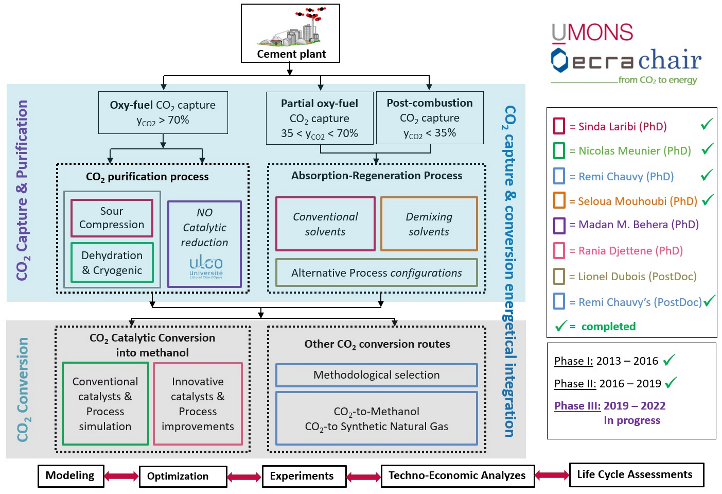|
The ECRA Academic Chair framework |

|
The ECRA Academic Chair research activities are focusing on the application, in the cement industry, of carbon capture and utilization process chain. More precisely, as illustrated here below, three CO2 capture processes chains are investigated, together with the CO2 purification step (if needed):
|
|
ECRA Academic Chair « From CO2 to Energy » Faculty of Engineering University of Mons BELGIUM |

|
· Oxyfuel combustion, leading to high CO2 contents in the flue gas thanks to a combustion performed with oxygen. In such case, the ECRA Chair is studying the CO2 Purification Unit (CPU) needed to obtain a sufficiently pure CO2 flow in view of conversion. More precisely, the first step of this CPU (namely Sour Compression unit (SCU)) was optimized thanks to Aspen Plus simulations.
· Partial oxyfuel combustion, where the combustion is not performed with pure oxygen but in O2-enriched conditions allowing to increase the CO2 content in the flue gas before a capture step.
· Conventional post-combustion CO2 capture, where the CO2 capture step is applied to a conventional cement plant flue gas.
For both partial oxyfuel and conventional conditions, the absorption-regeneration CO2 capture process using amine(s) based solvents is studied through lab and micro-pilot scales experiments, and also through Aspen Plus and Aspen Hysys simulations. More specifically, alternative process configurations are studied and a PhD Thesis is focusing on the development of a specific modeling for the use of demixing solvents in such process. In 2019, a new PhD Thesis will be also initiated in collaboration with ULCO (France) on a CO2 purification process involving a catalytic reduction of NO specie.
Regarding the CO2 conversion step, the ECRA Chair works more specifically on the CO2 catalytic conversion in methanol through experiments and modeling. A dedicated micro-pilot reactor was established to test different catalysts and to optimize the process. In parallel, the ECRA Chair is also investigating different CO2 conversion routes thanks to modeling and technico-economic analyzes, including also Life Cycle Assessment (LCA) studies.
|


